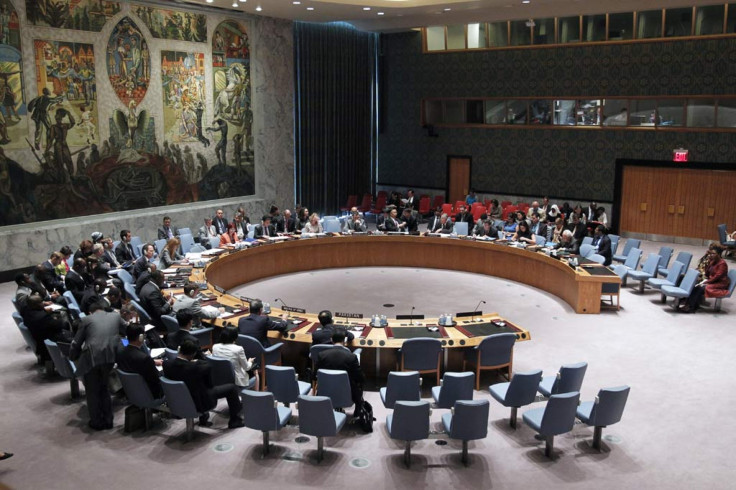Thanks, But No Thanks: Why Did Saudi Arabia Turn Down Seat On UN Security Council?

Saudi Arabia has rejected an offer to join the United Nations Security Council as a non-permanent member, citing the body’s “double standards” and its failure to alleviate the crises in Syria and Palestine, among other global conflicts.
The Saudi foreign minister Prince Saud al-Faisal (who withdrew from giving a speech at the UN general assembly earlier this month as a form of protest) also called for the UN to be revamped. "Work mechanisms and double-standards on the Security Council prevent it from carrying out its duties and assuming its responsibilities in keeping world peace," Saudi Arabia’s foreign ministry said in a statement. "Therefore Saudi Arabia... has no other option but to turn down Security Council membership until it is reformed and given the means to accomplish its duties and assume its responsibilities in preserving the world's peace and security.”
Had Riyadh accepted the invitation, the Saudis would have been one of ten non-permanent members for the Council with a term of two years (along with the five permanent members - the U.S., U.K., France, China and Russia). Aside from Saudi Arabia, the General Assembly also elected Chad, Chile, Lithuania and Nigeria to serve as non-permanent members on the Security Council, effective January 2014. These five replace Azerbaijan, Guatemala, Morocco, Pakistan and Togo, whose terms expire at the end of this year. The five other non-permanent members -- Argentina, Australia, Luxembourg, the Republic of Korea and Rwanda -- will remain on the Council until the end of 2014.
“Usually there is fierce competition to secure one of the 10 rotating seats on the UN Security Council - a chance to sit alongside the five permanent members for two years on the top UN body which rules on international security issues,” wrote BBC correspondent, Bridget Kendall. “Instead Saudi Arabia has used the coveted position to lodge a very public protest.”
The Saudis have been among the most vocal proponents of staging a military intervention in Syria, condemning the UN for falling to prevent the use of chemical weapons by the regime of Bashar al-Assad against his own people. "Allowing the ruling regime in Syria to kill its people and burn them with chemical weapons in front of the entire world and without any deterrent or punishment is clear proof and evidence of the UN Security Council's inability to perform its duties and shoulder its responsibilities,'' the Saudi Foreign Ministry added. Now entering its third year, the Syrian civil war has killed at least 100,000 people.
The Saudis also blamed the Security Council for failing to stop the spread of weapons of mass destruction in the Middle East – a likely reference to arch-enemy Iran’s nuclear program.
Dr. Dilshod Achilov of the Department of Political Science, International Affairs at East Tennessee State University, told International Business Times that Syria is the principal factor behind Saudi Arabia’s move. “By rejecting the seat, the Kingdom is making a symbolic move to highlight that the UN Security Council is a dysfunctional [body] dominated by conflicting strategic interests of the permanent members and that the voice of other non-permanent members don’t really matter much, if at all,” he said.
But, Achilov pointed out, that by rejecting the seat, Saudi Arabia is not really losing out on anything. “Everybody knows that the entire show is run by five powerful permanent veto players,” he noted. “However, the ten non-permanent members have no veto power, thus, no appreciable influence when passing resolutions.”
Dario Christiani, an analyst affiliated with the Jamestown Foundation, told IB Times that Saudi Arabia’s decision to reject a seat was “rather bold” and needs to be framed in a wider context.
“It is possible that some specific, concurrent dynamics -- such as the attempts to improve relations between the U.S. and Tehran and the recent surge in American oil production (which may reduce Washington's dependency on Riyadh), also played a role in pushing Saudi Arabia to [reject a UN seat],” he said.
“Syria is a decisive battleground for Saudi Arabia and it remains suspicious of the possibility of Iran increasing its regional role. A strengthening of Assad's position in Syria, as well as an Iranian-American rapprochement, are perceived as two rather dangerous developments for Saudi Arabia.”
However, even if the Saudis had accepted membership in the Council, some observers would have found it uncomfortable, given the kingdom's own repressive regime. "Saudi Arabia would inspire greater confidence in its leadership abilities at the UN's top body if it was to clean house on human rights issues, starting with granting women their rights and ending the crackdown on human rights advocates," said Phlippe Bolopion, UN specialist for Human Rights Watch.
Interestingly, the Saudis are increasingly unpopular in its own backyard. The Pew Research Center reported that Saudi Arabia’s image among its Muslim neighbors has been plummeting in recent years, particularly in Lebanon, Tunisia and Turkey. “Only in Jordan and Egypt is opinion of the desert kingdom overwhelmingly positive (88 percent and 78 percent, respectively),” Pew stated. “Elsewhere in the Middle East, views are mixed or even decidedly negative, as in the case of Turkey (26 percent favorable vs. 53 percent unfavorable).”
In contrast, Saudi Arabia, as the spiritual home of Islam, remains widely admired in Muslim nations far outside the Middle East.
© Copyright IBTimes 2024. All rights reserved.





















